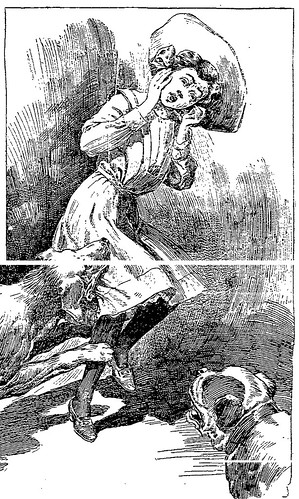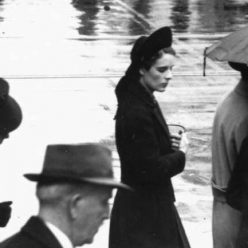Jack Vernon, resident of 245 1â„2 South Spring Street, was one of several hundred Angelenos to fall prey to the scourge of rabies which periodically struck downtown Los Angeles and its suburbs in the early part of the century. Thousands of rabid cats and dogs roamed the streets, attacking babies, school children, and adults. One Sunday during this outbreak a group of handsomely gowned women on their way to church sought safety from a charging mad dog by scrambling up the cliff side entrance to the Broadway Street tunnel, where they remained until a shotgun-toting policeman came to dispatch the menacing beast.
The first case of rabies during this period was recorded in Pasadena, where local health officials quickly passed an ordinance requiring pet owners to muzzle their dogs. The muzzle law brought a halt to the spread of the disease in that city, but it proved unpopular in Los Angeles, and after one week, was revoked. Members of the city health board objected to dedicating police manpower to enforce the ordinance, and residents protested the inhumanity of restraining man’s best friend in such a brutal way. No measures were taken to combat the epidemic downtown until tragedy struck a prominent city family. A few days before Christmas, 10 year old Joseph Scott Jr. went out on his front lawn at 984 Elden Street to eat a piece of bread and butter, when a stray dog jumped the fence and nipped him in the leg. As health officials were still in denial about the rabies threat in the city, they hadn’t raised an alarm, and the child’s family saw no reason to take extra precautions over such a minor dog bite. It healed over quickly. Six weeks later, the child became violently ill, and died in agony that night. His father, Joseph Scott, was president of the Los Angeles Board of Education and also President of the Chamber of Commerce. In his grief, Scott made every effort to draw attention to his son’s death, hoping it might save lives.
Likely alerted to the rabies danger by the publicity surrounding Joseph Scott Jr.’s death, Jack Vernon sought treatment in January for a dog bite at the Receiving Hospital at Hill and First Streets. A nurse poured carbolic acid into his wound and cauterized it, a very unpleasant business. It was routine to inform bite victims that rabies can lie dormant for up to three years, so Jack probably faced the dilemma of either having to track down the animal that bit him to confirm the rabies diagnosis, or waiting years before he could be sure he wouldn’t one day form a violent aversion to water, leap at his loved ones throats and suffocate to death from respiratory paralysis. The only other option at the time was to travel to the Pasteur Institute in Chicago, which had recently pioneered a rabies serum.
One Angeleno who sought the Pasteur cure after being bitten by a mad dog found little consolation in the treatment. He was on a train traveling back to Los Angeles, when, according to his fellow passengers, he suddenly stabbed himself repeatedly in the throat with a pocketknife. He stated later from his sickbed that his mind had given way under the worry that he might go mad, and had decided suicide was his only way out.

